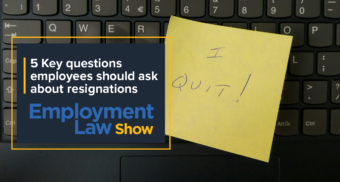Fact or Fiction Maternity and Parental Leave | Employment Law Show TV – S8 E09
Episode Summary
FACT OR FICTION MATERNITY AND PARENTAL LEAVE, long-service employee terminations, induced employment, and more on Season 8 Episode 09 of the Employment Law Show with employment lawyer Lior Samfiru, Partner at Samfiru Tumarkin LLP.
Watch above to discover your workplace rights and learn everything you need about employment law in Alberta, Ontario and British Columbia, on the only employment law show on both TV and radio in Canada.
Episode Notes
No severance for independent contractors
My sister was let go after working part-time as a bookkeeper for over 25 years. Her company had labelled her as an independent contractor and so said she was not owed anything. What can she do?
- Employees often misclassified: Employers often incorrectly classify their staff as independent contractors. Misclassified employees miss out on vital employment rights, particularly severance pay upon termination. Individuals unsure if they are employees or not should consider the level of control they have at their workplace, and whether or not they work exclusively for a sole employer.
Let go after taking a vacation
After taking a two-week approved vacation, I was let go by my employer. I was told that my services were no longer required due to changes in the workplace. I’m 55 years old and have worked at the company for just under 2 years.
- Severance entitlements: Employers are within their rights to approve or deny vacation requests. Ultimately, an employer can terminate an employee without cause for any reason. Severance must be paid adequately upon termination of employment. Failure to provide an adequate severance package can lead to wrongful dismissal.
- Learn more about severance pay
• Severance in Alberta
• Severance packages in Ontario
• Severance entitlements in B.C
- Learn more about severance pay
Long-service employee demoted
After 16 years my employer is moving me out of my current role and wants to move me into a different position within the company. Though the pay and benefits will be the same, this seems like it will be a demotion and I do not want to accept it.
- Changes to your job: Employers do not have the right to impose major changes to the terms of employment, such as a demotion, without an employee’s consent. A major change to the terms of a job can lead to constructive dismissal. Employees should be wary of accepting initial changes, as it permits their employer to implement more changes in the future.
Induced employee let go from job
I’ve worked for an accounting firm for over 20 years. A friend has approached me to join a new start-up. If I’m let go from the new company within a couple of years, are they obligated to pay me severance for the previous years of service as they recruited me to join?
- Induced employment: Signing a fixed-term contract ensures that at the end of the agreed-upon period, an employee is not owed severance pay. Employees recruited to a new position from a previous job who are let go without a fixed-term contract in place, could be owed enhanced severance pay. Severance packages would have to include the previous years of service employed at the prior company.
Fact or Fiction: Maternity and Parental Leave
- Announce their pregnancy: Employees do not have to announce their pregnancies within a certain time frame. Employees can determine when they are comfortable informing their employers of their pregnancy.
- A job-protected leave: Maternity and parental leave are considered to be job-protected leaves. Employees cannot be penalized or terminated as a result of taking leave.
- Hire a replacement for an employee: Employers can hire a replacement while an employee is on maternity or parental leave. Once an employee is ready to return, however, they must be given the same position. A replacement hire cannot be kept on instead of the employee.
- Return to the same position: Employees must be able to return to the same position they had before taking leave. If a position is no longer available for a returning employee, employers must find a comparable position.
- Employee announces a subsequent Mat Leave: Employers cannot decide to terminate an employee for announcing a maternity or parental leave. Employers could face additional legal consequences including human rights violations if they do decide to terminate employment.
✅ For more information on Maternity Leave in Canada, explore the following resources:
Resignation refused by the employer
My wife submitted a resignation letter effective immediately, but her employer has refused to accept the resignation and insists her contract stipulated she provide a month’s notice. Is she held to these terms as it seems a bit unreasonable if she’d like to begin a new position?
- Giving working notice: Employees should look closely at the terms outlined in their employment contract regarding notice periods. Employees must be prepared to uphold the terms they have agreed to in an employment agreement. A failure to give notice that leads to financial losses could ensure an employer can sue their former employee.
Pressure to return from medical leave
I have been off work for almost two years due to a medical condition. My employer is now saying I must either come back to work or resign as they’re understaffed. I am still recovering, and my doctors haven’t cleared me to return. What can I do here?
- Accommodations from an employer: Employees can take medical leave for as long as necessary with the support of treating doctors. Employers cannot force an employee to return from medical leave or pressure an employee to resign. Employees should provide their employers with a doctor’s note outlining a prognosis.
Rapid Fire Employment Rights
- Turn to the government for help: Generally, employees shouldn’t seek advice from the government upon termination. The government can only provide employees with information regarding their minimum severance entitlements.
- Track employees while using company equipment: Employers are within their rights to implement tracking software on company devices during work hours. Employers cannot track employees outside of a regular workday.
- Entitled to overtime pay: Managers are exempt from overtime pay entitlements. Many individuals who are given the title of a manager, do not perform managerial functions and are owed overtime pay.
- Denied vacation requests: Employers can deny vacation requests and determine when an employee can take time off.
- File complaints regarding bullying in the workplace: Employees are within their rights to voice complaints of harassment and bullying within the workplace. Employers that fail to investigate and address harassment complaints could face additional legal damages.
- Fired if you don’t sign a new employment contract: Employees can be terminated for any reason as long as it is not discriminatory, and adequate severance pay is owed.
- Miss the employer’s severance deadlines: Severance deadlines are imposed by employers as a pressure tactic. Employees have up to two years after the initial date of termination to pursue their severance entitlements.
PREVIOUS EPISODE: Employment Law Show S8 E08 – Fast Facts about Independent Contractors




